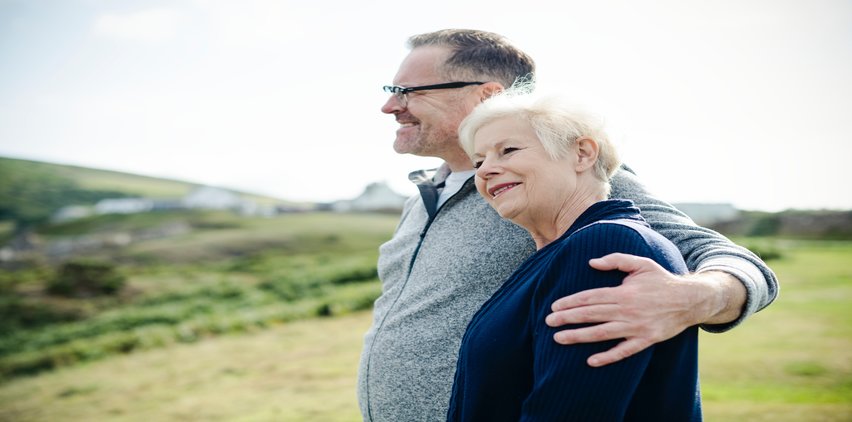

December 19, 2018 | Categories: Health, Sleep
When we say seniors and sleep, does anyone else call to mind a snoozing grandparent in a rocking chair? Portrayals of elderly in pop culture make it seem like a senior person can fall asleep anywhere, but, if you’ve experienced worsening sleep quality as you’ve aged, you might be wondering why it’s happening and if it’s avoidable.
Solving sleep disturbances is important in aging populations in particular. Sleep problems among the elderly are associated with significant morbidity and mortality and increase the risk for nursing home placement, according to research.
“Sleep disturbance and sleep apnea are associated with many different conditions in the elderly,” says Atul Malhotra, M.D., Vice Chief of Research, Pulmonary, Critical Care and Sleep Medicine and director of Sleep Medicine at the UC San Diego School of Medicine.
The two most common are sleep apnea and insomnia. Sleep apnea is a condition where people stop breathing when they are asleep. Insomnia is a condition where people have trouble falling asleep or staying asleep, says Dr. Malhotra. Both of these conditions can have serious health consequences. Aging is a risk factor for both of those conditions, Dr. Malhotra says.
Here are other reasons seniors may have more issues with sleep:
Older adults are more likely to suffer from lung diseases and heart diseases. Pulmonary problems, like pneumonia or chronic obstructive pulmonary disease (COPD), can lead to sleep problems in this demographic. Keep in mind that there’s good data suggesting that the majority of people can tolerate CPAP (continuous positive airway pressure) if you’re suffering from sleep apnea to get relief.
One study found that elderly people who reported excessive daytime sleepiness have a 49 percent relative risk increase of cardiovascular death (from cerebrovascular disease, myocardial infarction and heart failure), compared to those who do not report sleepiness.
Chronic pain is another reason anyone can experience trouble sleeping. In the elderly, pain is more common and could be a reason they don’t sleep well. Here are 9 reasons you’re not getting enough sleep.
Also called also called Willis-Ekbom Disease, this leads to strange, uncomfortable sensations in the legs and an urge to move them. It usually happens when you’re resting or lying down.
This condition can disrupt sleep and make it harder to fall asleep, says Dr. Malhotra.
The Centers for Disease control estimates that 7 million American adults over the age of 65 experience depression each year. One of the classic symptoms of depression is early morning awakening, says Dr. Malhotra. “They wake up early for unclear reasons and that can be from depression. Then there’s some data that were published 10 or 15 years ago in the Archives of Internal Medicine that showed if you have untreated sleep apnea, the incidence of the onset of depression is higher from untreated sleep apnea. That can be a problem.” Part of the issues with sleep apnea and sleep disruption are lack of energy, lack of interest and those things are also depressed symptoms. “Treating sleep apnea will make people feel better and that can be helpful in terms of treatment of depressed patients as well,” says Dr. Malhotra.
While you might picture an aging parent falling asleep in the chair, some seniors don’t have issues falling asleep; it’s often staying asleep that’s the most commonly-reported problem among older people with sleep disturbances.
Another issue is waking up too early and being unable to fall back asleep.
Age‐related sleep physiological changes can cause sleep issues, including an advanced sleep phase and decreased slow‐wave sleep, which result in that fragmented sleep and early rising.
“The message I think that’s important is that it’s not normal to have disrupted sleep,” says Dr. Malhotra. Falling asleep all the time isn’t normal. “While there are biological changes that happen with aging, the inability to stay awake or inability to sleep is not normal,” he says. If you’re someone who’s had sleep issues for several weeks, called chronic insomnia, or you’re concerned about a family member with this condition, make an appointment with your doctor.
“People don’t realize that these are treatable conditions,” says Dr. Malhotra. Snoring is not a normal thing to do so go talk to your doctor about it. If your doctor’s not experienced or comfortable dealing with it then go see a sleep specialist who is knowledgeable about this.”
There are lots of alternative therapies to help remedy sleep issues that aren’t machines or medications, says Dr. Malhotra. Talk to your doctor about the options that would be best for your sleep issues.
There is thought to be some contribution of sleep apnea to the development of Alzheimer’s disease, says Dr. Malhotra. “We aren’t entirely sure why. There may be genetic factors that underlie both conditions. It may be that the low oxygen levels and oxygen levels going low and then high and then low and then high could lead to oxidative stress or some people think may contribute to Alzheimer’s.
“We know disrupting sleep can impair memory formation,” he says. “There are potentially some links there between sleep disruption and Alzheimer’s. Although we don’t know for sure that treating sleep problems will prevent Alzheimer’s.”
The link between depression and Alzheimer’s is a condition known as pseudo dementia where people aren’t actually demented, they are severely depressed so they can appear to be demented and that potentially is a link between sleep apnea, depression and Alzheimer’s, says Dr. Malhotra.
(Read the final article PDF here.)
Leave a Reply